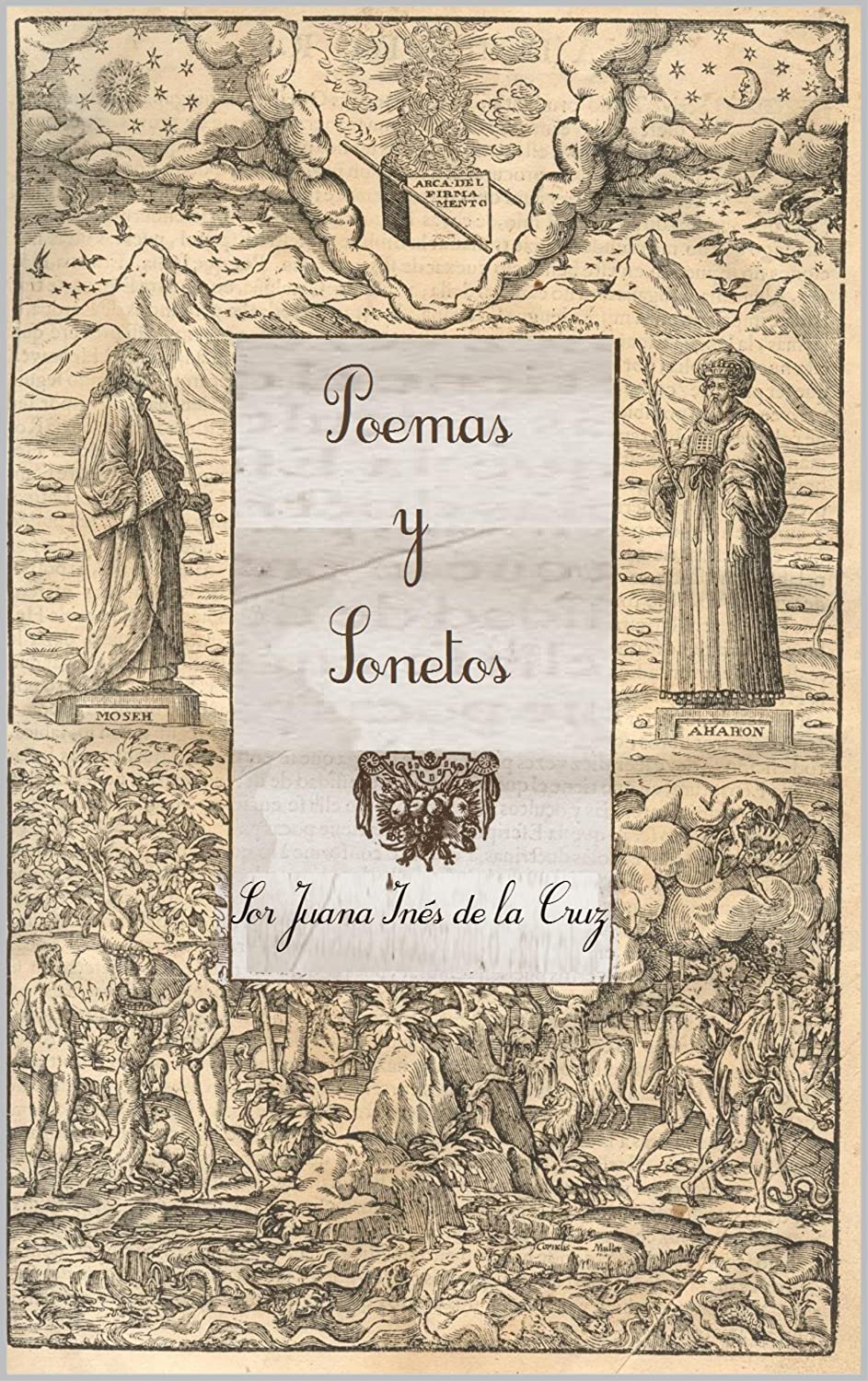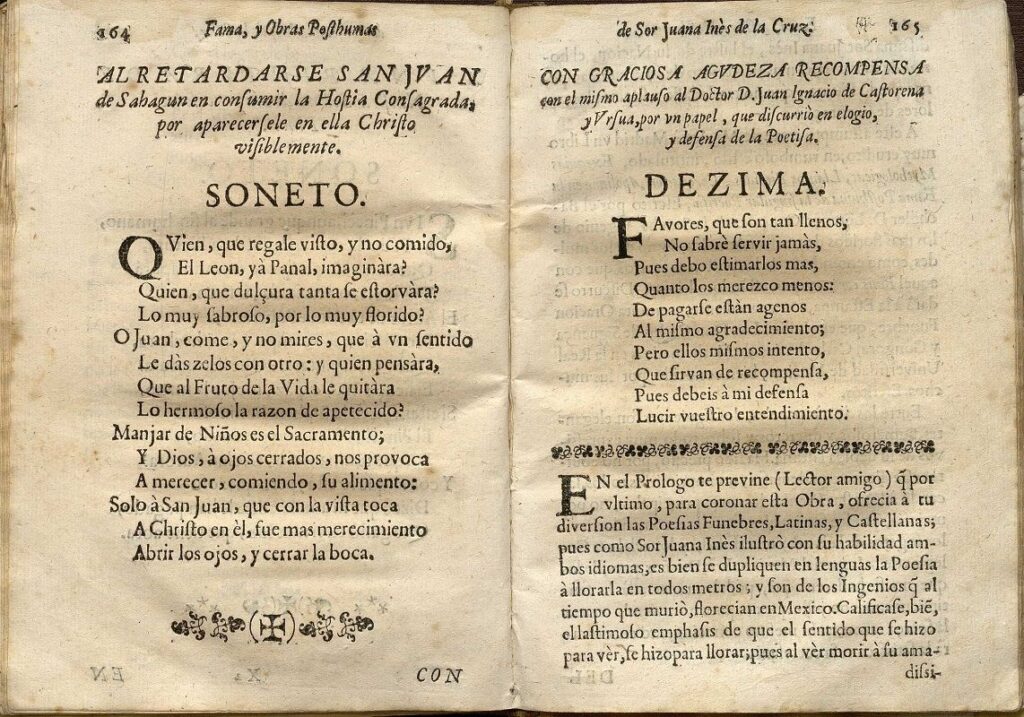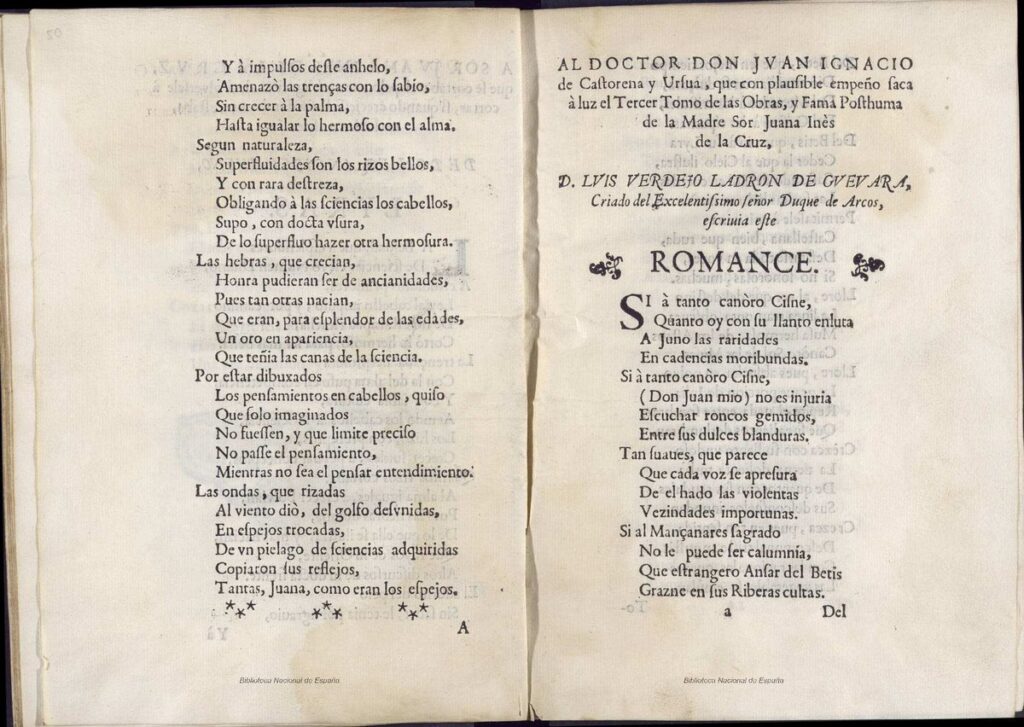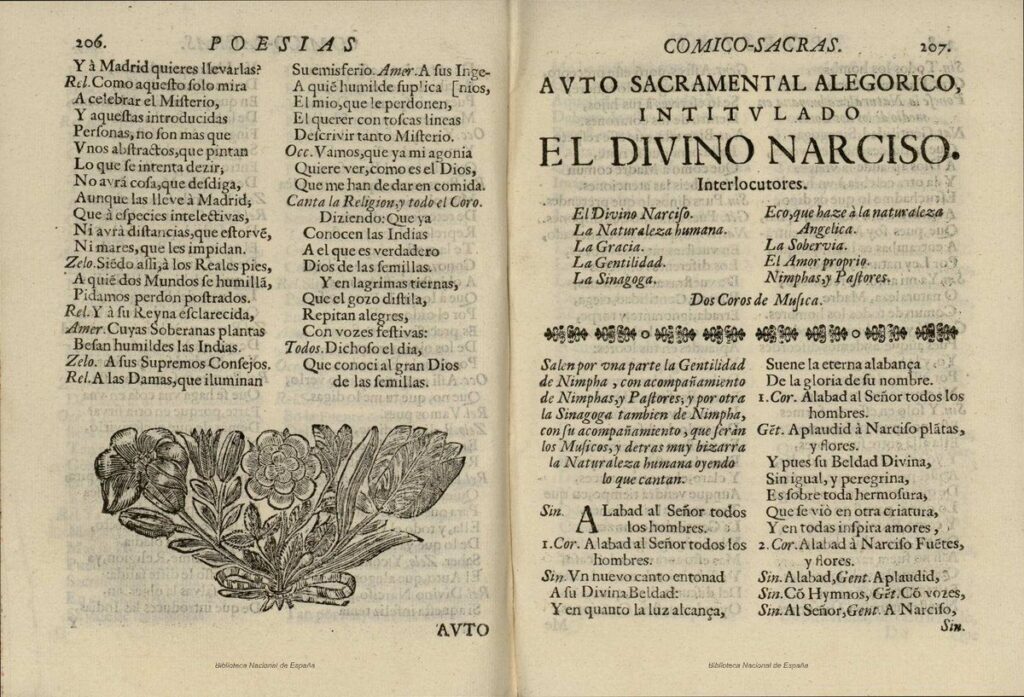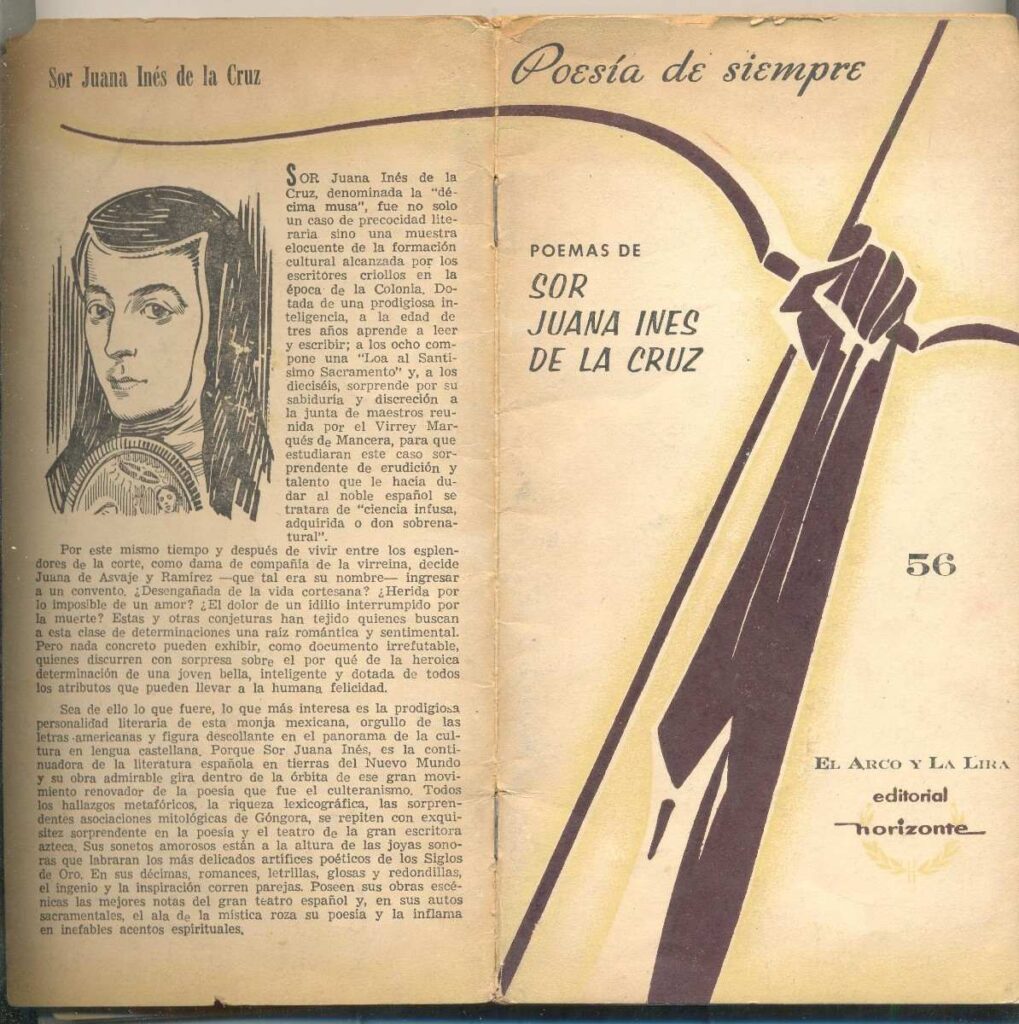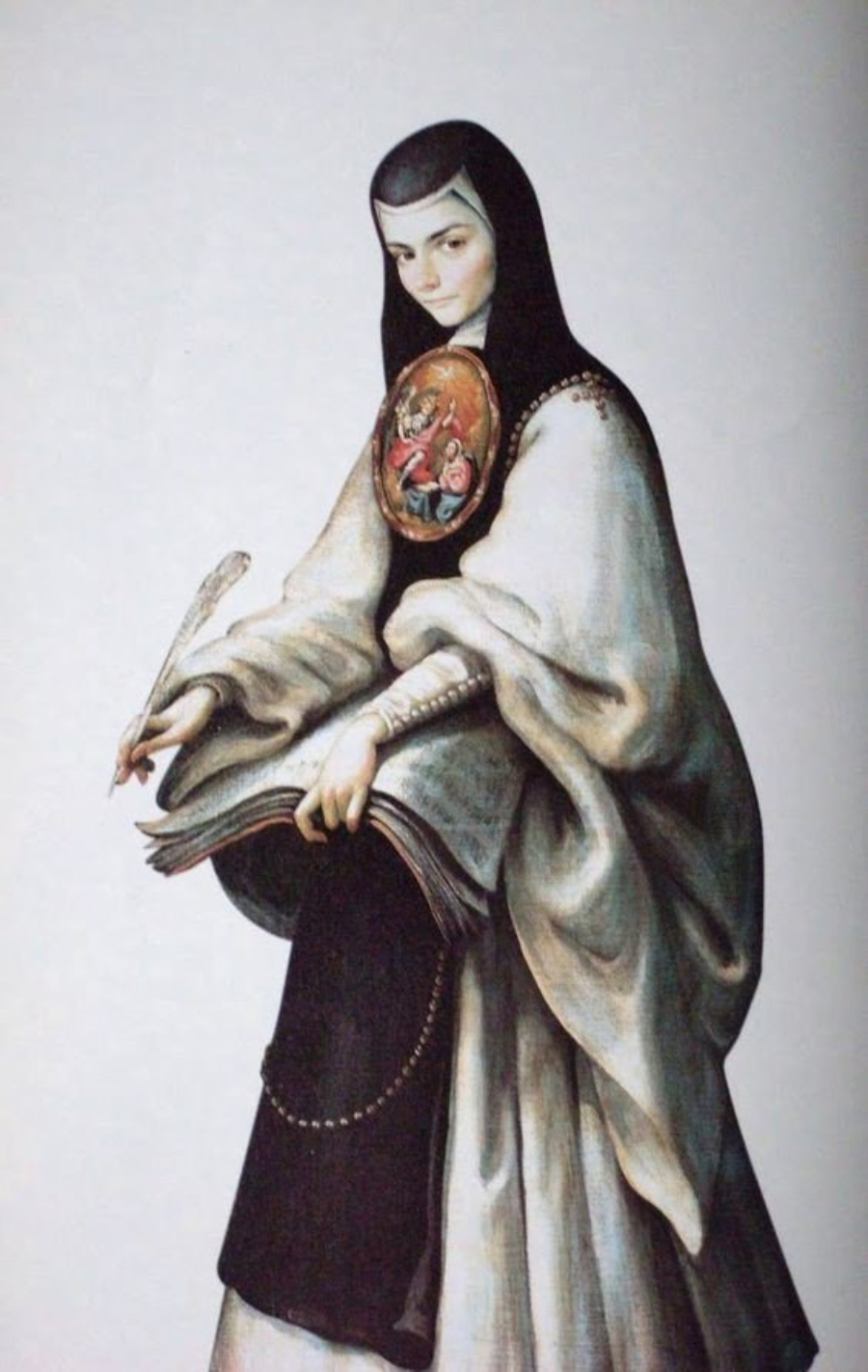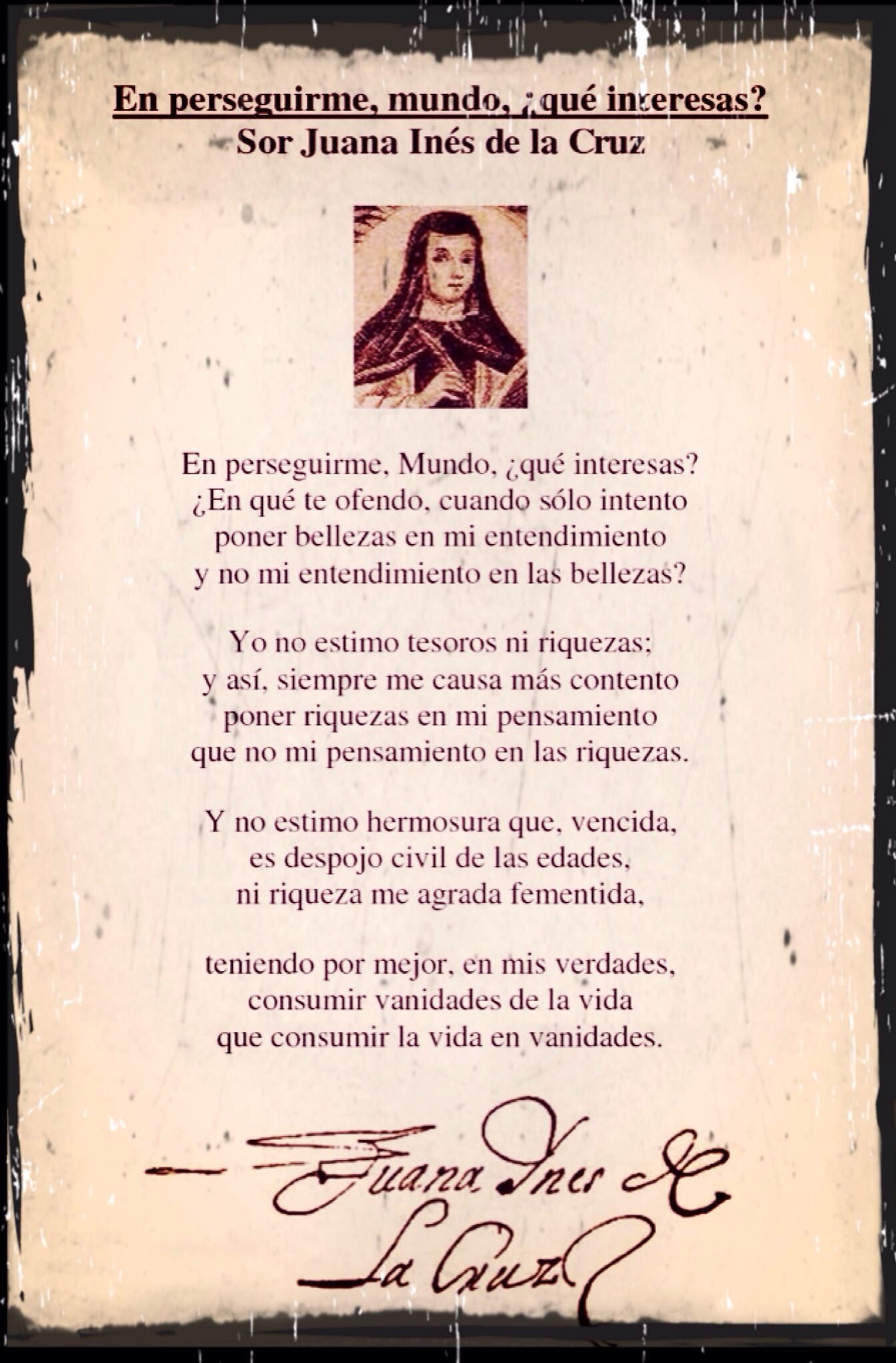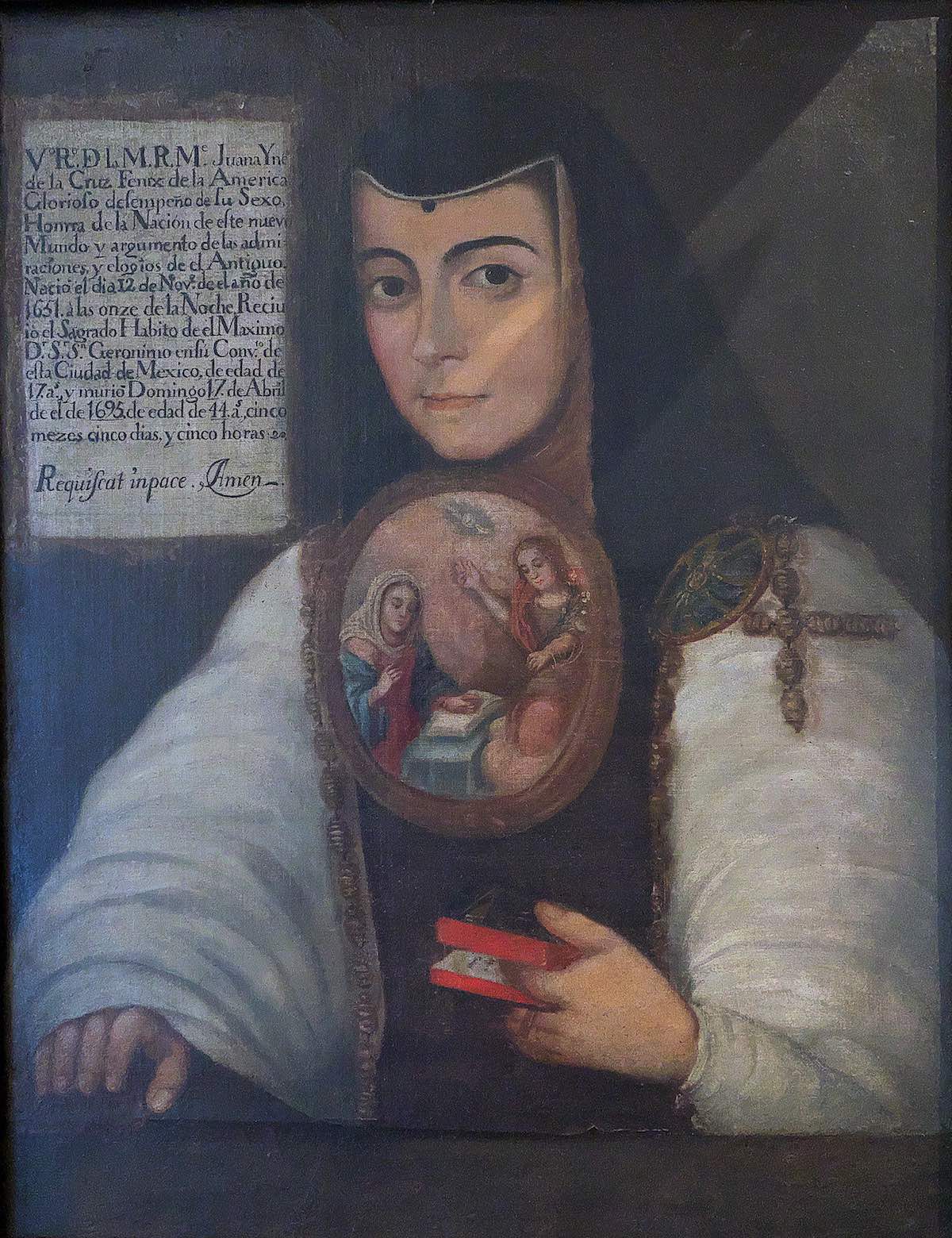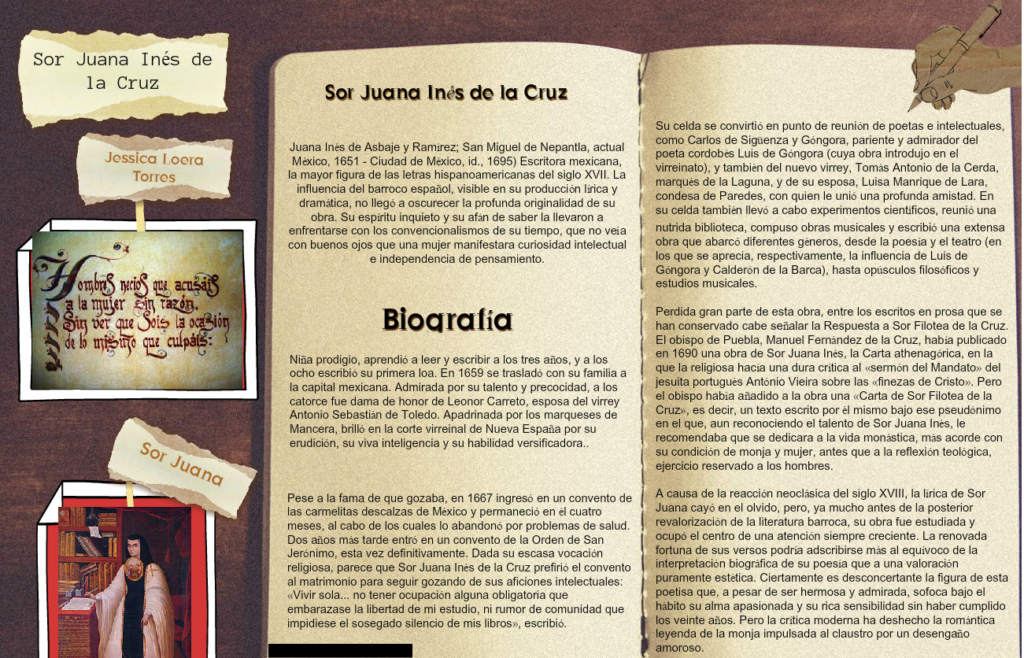Sonnets of Sor Juana it is a range of literary compositions with a rich intellectual content and usually refer to philosophical topics. It is a compendium of writing that transposes the reader to be immersed in a sublime environment. We recommend them!

Sonnet of Sor Juana
Sonnet of Sor Juana Inés de la Cruz, was the creation of a Mexican nun who throughout her existence dedicated it to Sanctification, as well as to the art of writing, being recognized as the most famous writer of the Latin American baroque artistic movement.
In this article we will present a list that contains the best and most popular sonnets embodied by Sor Juana, being her beautiful poetic compositions, that when you meet them you will be delighted with their poetic structures.
Below we show you a detailed list with a large part of the sonnets, so that you can delight your poetic part.
Sonnet I – Correspondences between loving or hating
Sonnet II – To his portrait
Sonnet III – In which he gives moral censure to a rose and in it to his fellow men
Sonnet IV – To Father Francisco de Castro
Sonnet V – Pursues the same subject, and determines that reason prevails against taste
Sonnet VI – Choose to die rather than expose yourself to the outrages of old age
Sonnet VII – To Hope
Sonnet VIII – In which he satisfies a suspicion with the rhetoric of tears
Sonnet IX – Containing a fantasy contented with decent love
Sonnet X – Shows feeling disgraced by the applause of her skill
Sonnet XI – Teaches how a single employment in love is reason and convenience
Sonnet XII – XII – The careless does not want to be forgotten
Sonnet XIII – Sonnet to Martin de Olivas
Sonnet XIV – Fittingly relates the tragedy of Priam and Thisbe
Sonnet XV – To Julia
Sonnet XVI – To Portia
Sonnet XVII – Magnifies the deed of Lucrecia
Sonnet XVIII – With a rope reelection mitigates the pain of a passion
Sonnet XIX – The election of a state lasting until death is fraught with animosity
Sonnet XX – Ingeniously tries to force the opinion that absence is greater evil than jealousy
Sonnet XXI – The same regret continues, and says, that he should not yet abhor such an unworthy subject, for not having him still close to his heart
Sonnet XXII – A jealous man refers to the common sorrow that everyone suffers and warns the cause of the end that the struggle of conflicting affections can have
Sonnet XXIII – Of love, previously placed in an unworthy subject, is an emblazoned amendment of repentance
Sonnet XXIV – Very painful effects of love and that, because they are not great, are equal to the garments of those who cause them
Sonnet XXV – New praise of the deed of Lucrecia
Sonnet XXVI – Complains about fate: he insinuates his aversion to vices and justifies his amusement to the muses
Sonnet XXVII – Resolves the question of which is to weigh more bothersome in found correspondences, to love or to hate
Sonnet XXVIII – To the Most Excellent Lady of Paredes
Sonnet XXIX – The Mexican muse, eminent daughter
Sonnet XXX – Crying inevitably runs in front of the one who loves
Sonnet XXXI – Inés, when they scold you for being a villain
Sonnet XXIII – Although you are (Teresilla) so young
Sonnet XXXIII – Inés, I rejoice with your love
Sonnet XXXIV – Go with God (Beatriz) being a scam
Sonnet XXXV – Although he presumes (Nife) that I am rough
Sonnet XXXVI – Condemnation for concealed cruelty, the relief that hope gives
Sonnet XXXVII – Praises with special success that of an exquisite musician
Sonnet XXXVIII – Although in vain, he wants to reduce the sorrow of a jealous man to a rational method
Sonnet XXXIX – On the death of the Most Excellent Lady Marchioness of Mancera
Sonnet XL – To explain the cause of rebellion…
Sonnet XLI – Applauds the astronomical science of Father Francisco Kino
Sonnet XLII – He mourns with all the death of the Lady Marchioness of Mancera
Sonnet XLIII – In which he consoles a jealous epilogue of the series of loves
Sonnet XLIV – I can neither have you nor leave you
Sonnet XLV – On the death of the Marchioness of Mancera
Sonnet XLVI – Convalescing from a serious illness, discreetly with the Virreina Lady, Marchioness of Mancera, attributing to her much love even his improvement in dying
Sonnet XLVII – As in the royal crystalline beach
Sonnet XLVIII – Attributed to Joan
Sonnet XLIX – Jocoso, a la rosa
Sonnet L – Explaining the highest quality of love
Sonnet LI – Curiously he wrote to mother Juana for her to reply
Sonnet LII – That mother Juana answered in the same consonants
Sonnet LIII – On the death of King Philip IV
Sonnet LIV – In which the poetess celebrates the birthday of one of her brothers
Sonnet LV – A bull having killed the horse of a toreador knight
Sonnet LVI – Celebrating a Doctor Graduate
Sonnet LVII – Praise in Father Baltasar de Mansilla of the Society of Jesus, great preacher and confessor of the Lady Virreina, both wisdom and modesty
Sonnet LVIII – To the priest Br. D. Diego de Ribera, singer of the dedication of the cathedral
Sonnet LIX – To the priest Br. D. Diego de Ribera, singer of the works of the Viceroy Archbishop Don Fray Payo Enríquez de Ribera
Sonnet LX – To the priest Lic. D. Carlos de Sigüenza y Góngora, in front of his Panegyric of the Marqueses de la Laguna
Sonnet LXI – To a painting of Our Lady, by a very excellent brush
Sonnet LXII – To Señor San José, written according to the subject of a contest that requested the metaphors it contains
Sonnet LXIII – When Saint Juan de Sahagún delayed in consuming the sacred host because Christ appeared to him visibly in it
Sonnet LXIV – Your age, Great Lord, as long as it exceeds
Sonnet LXV – You say you don't remember, Clori, and you lie
Sonnet LXVI – Most High Lord Hispanic Monarch
Sonnet LXVII – To the sentence that Pilate gave against Christ
Sonnet LXVIII – On the death of His Excellency the Duke of Veragua
Sonnet LXIX – To the Same
Sonnet LXX – To the same
Sonnet LXXI – From The Divine Narcissus Table IV – Narcissus
Sonnet LXXII – Of the pawns of a house Act I – Ana
The love sonnets shaped by Sor Juana Inés de la Cruz, have an extensive and diverse custom in Western love poetry, which ennobles Greek literature. With her poetic style, the woman is positioned at the center of events, which makes the individual personality reborn with a range of amenity. We recommend reading the following article Poems of the Middle Ages
Certainly Sor Juana knew what the Petrarchan practice was, so it has been shown that in her works characteristics of Petrarch's poetry are achieved, her affective sonnets are grouped with the cultured poetry of the Petraquita songbooks. Juana Inés transmits her own transcendental experiences with her poems.
Sor Juana was a great teacher of the poetic world of sonnets, received from the Hispanic practice of the great mentors, including many other famous poets, belonging to the Peninsula, perhaps those of the colonies are presumed.
Sor Juana's sonnets treasure the best customs of the peninsula, and also contain a flavor relative to New Spain. During that time and with a high level of culture that existed in the lathe when she wrote, the poet was considered the best and who widely dominated the poetic canon of those times, who subtly changed the imitation to which she was never a slave.
In them he impregnated his own personality and directed a New Spain society that already enjoyed great and small lawyers such as: ecclesiastical figures from the big city, hidalgos from the viceroyalty court, scholars of science, as well as in the environment where it was composed. music, poetry, and that she listened to Christmas carols in the majestic chairs, that she was fascinated by the recitations of the victorious arches and the poetic celebrations.
Thus, the internationalization of poetry, being the most prestigious lyrical genre during those times, was vigorously and copiously established in America, as Eugenio de Salazar points out in his message to Herrera when he showed us the lyrical guidelines that governed the world. cult of New Spain:
Our mother Spain already sends us
from his copious tongue a thousand riches
that make this strange land rich,
Tuscany also sends the beauties
from her sweet tongue to this post
and already going the Proencia to this
his graceful speech communicates
and lends a large remainder of his credit;
also came the rich Greek language
to these remote parts of it:
and in them it is pointed out and amplified
New Spain...
The poetic world where Sor Juana found herself involved, which also already takes root in her monarchical Mexico, intervenes in the being, molding the intellectual and poetic development of the nun. You can appreciate the range of themes and voices that she acquires in her work, to show a new world expressed and innovative in the hands of a native and erudite woman, as well as the reflection of the conscience that possessed her peculiarity as a literary woman. and intellectual.
Sor Juana's sonnets were always present, because their author could not stop writing, she remained willing to capture all kinds of sonnets as poetic skill, as well as being ready to seek recognition from official authorities, either within or outside the convent; her mission, to achieve recognition for her art of writing.
Among all the sonnets written by the religious Sor Juana, there are twenty-one love sonnets that are fragmented into two huge fractions: ten sonnets of orthodox concepts and eleven heterodox. In the first it contains six sections, while in the second there are only four; which means that Sor Juana rehearsed in her sonnets, within the theme of "orthodox love"; with the six themes, while in the group of "heterodox" she essayed only four, but it contains a large part of sonnets, namely:
Orthodox concepts of love
Sonnets such as:
Reciprocated and incorruptible love
pain of love that expects no reward
rational love
Absence
rhetoric of tears
Power of Fantasy
The classification of the sonnets that Sor Juana made looks interesting, and in this case we are going to talk about the one that corresponds to Reciprocated and incorruptible love, this fragment is found within numbers 169 and 183 of the Méndez Plancarte numbering, which are specifically to this sonnet.
Where she expresses, Fabio, the masculine word to which she directs her poetic voice, refers to the poet's preferred masculine name; you can appreciate that she will always be present as a loved one by magnificence.
It can be seen in the sonnet, a reasonable logic, that the personal seal of the nun:
Teaches how a single employment in love is reason and convenience
Fabio: in the being of all adored,
are all ambitious beauties,
because they have the altars for idle
if they don't see them full of victims.
And so, if they are loved by only one,
they live off the quarrelsome Fortune,
because they think that more than being beautiful
it constitutes deity to be prayed for.
But I am in this measure,
that in seeing many, my attention capsizes,
and I just want to be reciprocated
of the one who collects income from my love;
because being loved is the salt of taste,
that damages what is missing and what is left over.
In the quatrains of this sonnet, it can be seen that Sor Juana uses the voice of a woman, and alternates with the classic yo tú, the nun exposes what happens in general: she questions the feminine condition of the ideals, which the women of to be adored by many men; if they are loved by only one man, they lament their wealth by thinking that their beauty does not matter much, as being demanded by many, which makes them feel like a deity. The expressions “deity”, “aras”, “victims” and “adored”, transport us to the aspect moments of courtly love.
As for the sonnet of love that does not expect reward, three sonnets can be evidenced that speak about different aspects of courtly love, which expresses about sublime love
I love Lisi, but I do not pretend
that Lisi reciprocates my finesse,
Well, if I judge its beauty possible,
to your decorum and my apprehension I offend.
Not undertaking, only, is what I undertake;
Well I know that to deserve such greatness
no merit is enough, and it is simplicity
act against the same thing that I understand.
As a thing I conceive so sacred
your beauty, who does not want my audacity
to hope give not even a slight entrance:
then yielding my joy to hers,
for not getting to see her misused,
I still think it felt like seeing her mine.
In this sonnet, the most sublime representation of love appears, that courtly love: the most immense love, is the one that does not expect anything in return, what it seeks is to be close to God. The writer takes on the male voice: he is the troubadour who turns to the Provençal gift, exclaiming an impossible love, because he cannot and does not even try to have that love.
In the second sonnet of this classification the following is found: Arduous elements of love, and that not because they are great resemble the garments of those who originate it
See me, Alcinus, tied to the chain
of love, step in her irons shackled,
miserable slavery, desperate
freedom, and consolation of others?
Do you see the soul full of pain and anguish,
hurt by such fierce pains,
and between the living flames scorched
judge himself unworthy of his punishment?
Do you see me follow without a soul a nonsense
that I myself condemned as strange?
Do you see me shed blood on the way
Following the vestiges of a hoax?
Are you very admired? Well, you see, Alcinus:
The cause of my harm deserves more.
The poetic voice is appreciated in this sonnet, which is only female, which is expressed to a male confidant, Alcino, to whom she confesses her love anguish: chain, irons, slavery, despair and anguish generated by love.
These anguish transfer back to the suffering typical of courtly love, narrations that continue in the verses of the second quatrain, namely: the pain, the anguish, the torments and the clemency that the soul suffers. The lover is ashamed of the suffering she carries because the loved one has much more value.
Now, it is up to us to talk about the sonnet Rational Love, it refers to a response by Sor Juan to a curious person who expressed in writing the request that she respond to him, so that the nun did so, using the same metrical consonants used by her fan.
This demonstrates the level of culture and simplicity with which the people of New Spain society addressed a famous nun, as well as the great devotion that remained. Sor Juana also shaped other sonnets with established consonants, which is linked to number 181 "You say you don't remember, Clori and you lie."
Undoubtedly, the gentleman who sent him the sonnet was an assiduous reader, which indicates that the manuscript copies of Sor Juana's literature moved among the different readers of her works, who of course gave their opinions among themselves, and who had the freedom to interested directly, so they sent requests to the writer, as in this case.
The present sonnet that follows, is among those of forced consonants, being the only one that can be pointed out among the orthodox, according to the classification
That mother Juana answered in the same consonants
It is not just by whim to have given
in loving you, my good, well I couldn't
someone that your garments knew
deny yourself that you deserve to be loved.
And if my unfortunate understanding
so unable to meet you outside,
from such a rude mistake I still couldn't
find excuse in everything ignored.
The one who would have known you,
or he has to love you or confess the evils
who suffers his ingenuity in what is understood,
joining two unequal ends;
with which he has to confess that you are loved, so as not to give such improportions.
This sonnet, maintains the female voice and I you, corresponds to the group that refers to rational love, as the literary calls it, comes from the merits, from the garments, which are alerted in the person; It is not about “love by whim”.
It is observed, the game that exists with the words "to know", "ingenuity" and "understanding": it has the ability to look at the gifts and garments of the creature to love it.
It is the turn to talk about the sonnet Absence. It is evident that the poet shapes different poetic arrangements, referring to the theme of absence that has remained perennial in love poetry throughout her range. Among the various lyrical arrangements of her, is present the only sonnet that deals with the topic.
Only with sharp ingenuity does he force the opinion that absence is a greater evil than jealousy.
The absent one, the jealous one, is provoked,
the former with feeling, the latter with anger;
he presumes the offense that he does not look at,
and he feels the reality he touches.
This one tempers, perhaps, his mad fury
when the speech in his favor raves,
and without intermission he sighs,
Well, nothing to his pain the strength apocalypse.
This doubtfully afflicts his patience,
and that one suffers certain his sleeplessness;
this one opposes resistance to pain,
the former suffers heartbreak without her;
and if it is a penalty of damage, finally, the absence,
then it is greater torment than jealousy.
It is a sonnet embodied in the third person where Sor Juana reflects on what is worse in love affairs: jealousy, the absence of the loved one, or distance.
Other lyrical arrangements of Sor Juana, which refers to the topic of absence, show the following elements: absence as a strong pain, and leads to yearning for death, which is evidenced in "since to say goodbye", as well as "Divine my owner”.
Then, we will be talking about the sonnet Rhetoric of the plain, it refers to two sonnets in which Sor Juana recounts one of the most spectacular that she will capture. The voice me and you, is presumed to be a woman's, although it cannot be confirmed grammatically:
Of that pure and excellent sight
spirits come out alive and on fire,
and being received by my eyes,
they pass me to where the evil is felt;
get in the way easily
by do mine, moved by such heat,
they come out of me as lost,
calls of that good which is present
It is observed in the two sonnets, which narrate the exchange of glances and what originates "turns on" the gaze of the loved one present: the evocation of the heart "where evil is felt" as a point of loving feeling, and the search for being beloved, who leads the inner process of the "spirits" of the two.
In this paragraph we will be talking about the sonnet of the Power of Fantasy, being one of Sor Juana's most famous sonnets, and justice is present in its content:
Containing a contented fantasy with decent love
Stop, shadow of my elusive good,
image of the spell that I love the most,
beautiful illusion for whom I happily die,
sweet fiction for whom I live.
Yes to the magnet of your attractive thanks
serve my chest of obedient steel,
Why do you make me fall in love flattering
if you have to mock me then fugitive?
More emblazon can not, satisfied,
that your tyranny triumphs over me:
that although you leave the narrow bond stolen
that your fantastic form belted,
it does not matter to mock arms and chest
if you carve prison my fantasy
It is present in this sonnet, where Sor Juana transparently opts for the female voice, and the use of the pronouns you and me. The words used in the first quatrain such as: "shadow", "image", "illusion", "fiction", are scholastic meanings with Latin origin, which have been used in the link with the mind at the same time, that the literary he uses it to address a loved one.
Sor Juan has to her credit other literary compositions, tenths and a gloss, where she refers to thoughts to take the topic of absence: the lover, through thought, who never goes away no matter how far away he is: in the gloss relates that it will have “always thinking of you / always thinking of you”, transforming the philosophical thoughts of this sonnet that is linked to religious love in the glosses, when it expresses: “Here in the soul I will see / the center of my cares / with the eyes of my faith: / what tastes imagined / also a blind he sees it".
Heterodox concepts of love
In this concept are:
Matches found
Love and hate
reprobation of love
Temporality of love
In these sonnets, Sor Juana deviates from what is established by the lines that are granted to courtly love and, with great specialization, to Petrarchan, showing the following concepts: it includes a love that adjusts to the facts, excluding the loved person if considers appropriate; reveals his united feelings of hate and love towards the same person, and leads to conclusions about weirdness; she demonstrates loves that must be approved, demonstrating her feelings of guilt, and in fact affirms that love is not for eternity, but transitory.
In the sonnet Found correspondences, in the first paragraph it is about three sonnets of the religious, and establishes that they are always united. In these three sonnets, there is also a sharp, delicate and ingenious verbal game, which shows off the lithic mastery of the nun, at the same time that she investigates elements of love.
Solve the matter of which is the most uncomfortable moment in found correspondences, love or hate.
That Fabio doesn't love me, seeing himself loved,
It is pain without equal in my sense:
more, that Silvio loves me, hated,
It is minor evil, but not minor anger.
What suffering will not be tired
if they always resound in your ear,
after the vain arrogance of a loved one,
the weary moan of a scorned?
If Silvio's performance tires me,
Fabio tired of being exhausted;
if I seek gratitude from him,
the other gratefully looks for me:
for active and passive is my torment,
Well, I suffer in loving and being loved.
In the sonnet Love and hatred, there are two sonnets in this fragment, namely:
That gives means to love without sorrow
I can't have you or leave you
I don't know why, leaving you or having you,
there is an I don't know what to love you
and many yes I know what to forget you.
Well, you don't want to leave me or make amends,
I will temper my heart with luck
let half be inclined to hate you
Even if the other half is inclined to love you.
If this is force to love each other, there is a way,
that it is to die to be always quarreling;
no more talk in heat and, in suspicion,
and whoever gives half does not want the whole;
and when you're there doing it to me,
You know I'm doing the undone.
In this sonnet, the theme of what could be known as "half love" is present: one cannot exist without the presence of the loved person, nor with her. Likewise, an ingenious tone can be appreciated, but, with its spontaneous content, the colloquial is a striking model, which any Mexican person today can use in their daily conversation.
Of love, put before in an unworthy subject, it is emblazoned amendment of repentance
When I see my mistake and your vileness,
I contemplate, Silvio, of my mistaken love,
how grave is the malice of sin,
how violent the force of a desire.
To my own memory I hardly believe
that could fit in my care
the last line of the despised,
the final term of a bad job.
I would like, when I get to see you,
Seeing my infamous love, being able to deny it:
but then just reason warns me
that it is only remedied in publishing it;
because of the great crime of loving you,
It's just pretty sad, admit it.
The poet Sor Juana, has other compositions that are linked to the theme, such as the absence that ends in oblivion, this in turn to the variation, which means, the separation of the lovers, to the "disposal" who live. In other of her arrangements, forgetting is close to love “whether heartbreak or anger”: “Who does not admire that forgetting, you gave so little of love, of who walks to the first, to the second is approaching?
In this sonnet Temporality of love, the poet alludes to the "disapproval of love": reproduction, or repentance, delimiting the culmination of love, for which she points out that love is not forever that changes.
Emblematic Sonnets of Sor Juana
It is important to point out that Sor Juana, among so many poetic compositions, has sonnets considered emblematic within her accumulation of writings, among which we can mention:
That consoles a jealous epilogue of the love series
It is a sonnet composed of fourteen verses of major art in rhyme, usually hendecasyllables, and in sets in two quatrains and two triplets. The nun, has the ability to show in this sonnet, the luck that love has when the jealous, moved by the passions from the beginning, wraps it up and lets itself be dragged. She expresses from the jealousy that she felt for fear of losing her beloved, they become the fact of losing her.
Complain about luck: hints at his aversion to vices and justifies his amusement to the Muses
In this sonnet, the poetic voice faces the world, with its boasts and corruptions. Because of these incitements, for the literary there is no possible difficulty, maintaining: what would money and preciousness be worth without understanding?
Contains a fantasy content with loving decent
The reverie of love is present in this sonnet. It not only expresses love as a relationship between humans, but as a sublime experience. Divine love cannot be seduced, however it can be recognized.
Foolish men you accuse
The famous sonnet, entitled "Foolish men who accuse you...", refers to a redondilla, which means a sonnet of stanzas composed of four verses of minor art with consonant rhyme, the first with the last and the second with the third. Showing in this sonnet, so special that the poet, questions the position of men towards women.
To Christ in the Blessed Sacrament, communion day
It is a sonnet, where the expression of lyrical romance is achieved to deal with a range of verses, usually eight syllables. These sonnets have an assonance rhyme in pairs, while the odd ones are independent.
It can be seen in this romance, how sublime love is present, this time in Christ, materialized in the Eucharist. The presence of Almighty God, alive and present in the Eucharist, then, is the way of the presence of absolute love that exalts and justifies existence.
After knowing the great list of Sor Juana's sonnets, and in detail many of them for being significant within the lyrics of this nun, we are going to make known who this nun was who dedicated herself to capturing with her own handwriting, so similar statements that marked his life and the existence of many readers.
Biography of Sor Juana Inés de la Cruz
Juana Inés de Asbaje y Ramírez de Santillana, known as Sor Juan de la Cruz, was born on November 12, 1648, in the city of San Miguel de Nepantla, State of Mexico, Mexico.
https://youtu.be/EqExgGAynPU
His father, Pedro Manuel de Abaje y Machuca, a Basque captain, originally from Vergara, Guipúzcoa, who was married, and when he met Isabel Ramírez de Santillana de Cantillana, a native of yecapixtla, a town in the state of Morelos in Mexico, got together and conceived three daughters. Being Juana Inés the second of the daughters of this union. They were not united in marriage.
Many experts and researchers on the subject have not yet elucidated the cause that affected Sor Juana, when she became known as an illegitimate daughter, because her parents were not united under the sacrament of marriage, however, they say that on many occasions this matter remained undisclosed by her.
During her childhood she was a precocious child with outstanding intelligence, at the age of three she began to draw her first writings in the form of doodles, and at seven years of age, she wrote poetry.
Sor Juana lived a good part of her childhood in Panoayan, on a farm owned by her maternal grandfather, in the house there was an extensive and well-stocked library where Sor Juana kept looking for books to read, so it is estimated that at that time campus his liking for reading was born, as well as enriching his knowledge.
In her childhood, Sor Juana stood out for being a girl with great intellectual abilities, beginning when she was three years old, learning to read and write, and at eight years old she had the grace to capture her first praise of the Blessed Sacrament, composed in sonnets in Spanish as well as in Nahuatl, a language learned when he shared with the slaves on the hacienda of his beloved grandfather.
In 1659, he moved with his family to Mexico City, where he lived in the house of his aunt María Ramírez and Juan de Mata, husband of his aunt.
Over time, in the years 1663 and 1665, Sor Juana is praised for her skills and literary art, in addition to her brilliant intelligence and great knowledge, this helps her enter the court of Viceroy Antonio Sebastián de Toledo, Marquis de Mancera with his wife, Viceroy Leonor de Carreto.
During all that time, Sor Juana had the Viceroy as her protector, which allowed her to develop great literary skills, capturing sonnets and poems, many of which were commissioned.
From an early age, Sor Juana decides to enter the convent, preferring to have a religious life, instead of giving herself to marriage, in her opinion, inside the convent she continued learning without limits.
In 1667, Sor Juana entered the Carmelite convent, which she later had to leave due to health problems. But after some time passed, she definitively entered the Order of St. Jerome, where she stayed in a single and comfortable room.
Being in this Order of Saint Jerome, Sister Juan, has great opportunities to continue her studies, scientific research, dedicate herself to writing, arranging melodies, capturing plays, and she was even able to receive visits from her friends, to where he held long talks with other intellectuals and poets, as well as performing other tasks. It was so much that she had the possibility of building a significant library in her own room.
Among the characters who visited her, Carlos de Sigüenza de Góngora, a relative of Luis de Góngora, who had a great influence on her literary art, can be highlighted, which can be seen in her sonnets and poetic works.
In the last years of the life of the nun Sor Juana Inés de la Cruz, they developed suffering the death of many of their great friends, the social revolts of New Spain, and the presence of devastating epidemics that ended many lives.
Because of these events, Sor Juana had abandoned the art of writing to devote her full time to the mystical life. In the same way, she went to support the other companions of her convent, helping those who had contracted the disease of the cholera epidemic that punished all the inhabitants.
Sor Juana de la Cruz was surprised by death one morning on April 17, 1965, at the age of 43, because she was infected with the epidemic. She was buried the same day, and her burial ceremony was preceded by her great friend Carlos de Sigüenza y Góngora.
After his death, his recognition was exalted with his literary works, being considered one of the greatest manifestations of the most significant baroque of the XNUMXth century and the Spanish Golden Age, which meant that his name achieved an important level within the environment of the literature of New Spain.
His work
Sor Juana dedicated her life to writing a range of works, leaving to the delight of many readers her extensive knowledge, engineering, and skills in literary art. It is said that many of the works written by Sor Juana were due to being works commissioned by different people. His different literary works are specialized for the great zeal of his controversies, for his expressive character, his ability to analyze issues about love, protect women, wisely use literary resources, qualifiers, conclusions, among many others. .
his theatrical works
In her plays, Sor Juana was characterized by writing comedies in which great dedication and care were evident to produce entanglements and errors within her stories.
The efforts of a house: it is a comedy made up of a praise two farces. It is described as one of the most brilliant works in Latin American literature, which was shaped by Sor Juana. Finally, it talks about the failed wishes of a nun, a character who is recognized for her strength and difficulties that couples experience in her daily life.
Love is more maze
It is a comedy, written with the support of the monk Juan de Guevara, who completed the second part of the work, the theme has a mythological content. The presentation of this work took place in the celebrations of the assumption of the viceroyalty of Gaspar de la Cerda Mendoza, during the year 1689.
Sacramental cars
The poet Sor Inés, dedicated herself to capturing three autos sacramentales, it is a specifically religious play, which was commissioned from Madrid. These works receive the titles of: The martyr of the sacrament, The scepter of José and The divine Narcissus.
Poetry
Sor Juana Inés de la Cruz, a woman who demonstrated her poetic ability with outstanding originality and delicacy to exclaim her range of themes of life, love, heartbreak and friendship.
His work entitled the First Dream, the only work written by his own inspiration, published in 1692. It is identified as a long poem made up of 975 lines. First I dream, a poem in which Sor Juana emphasizes the need for human beings to gain knowledge and enjoy enormous scholarly skills.

